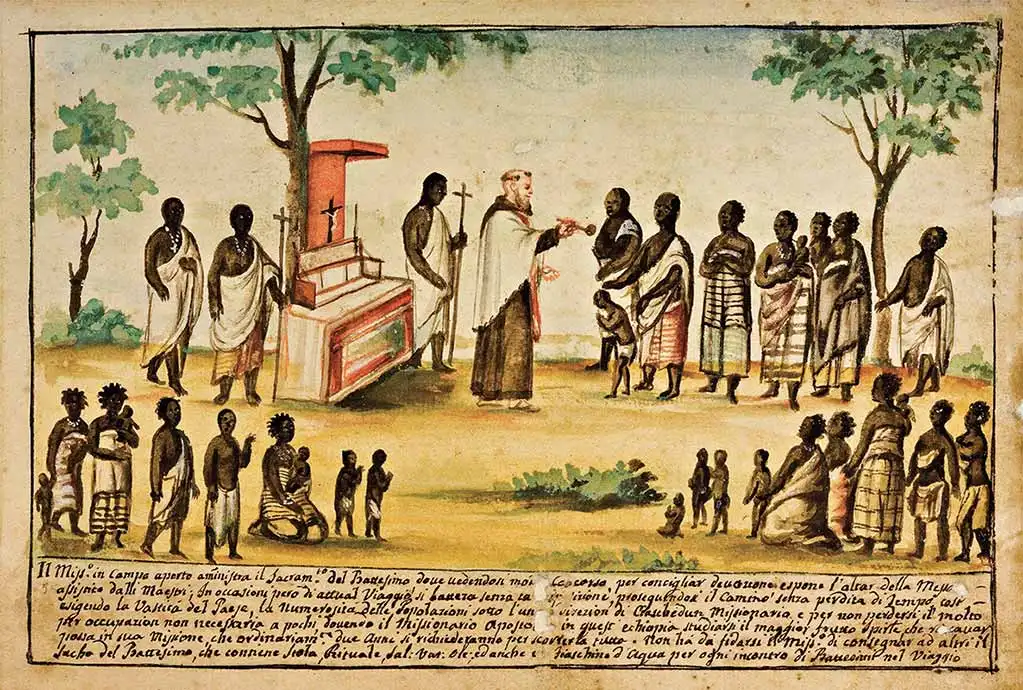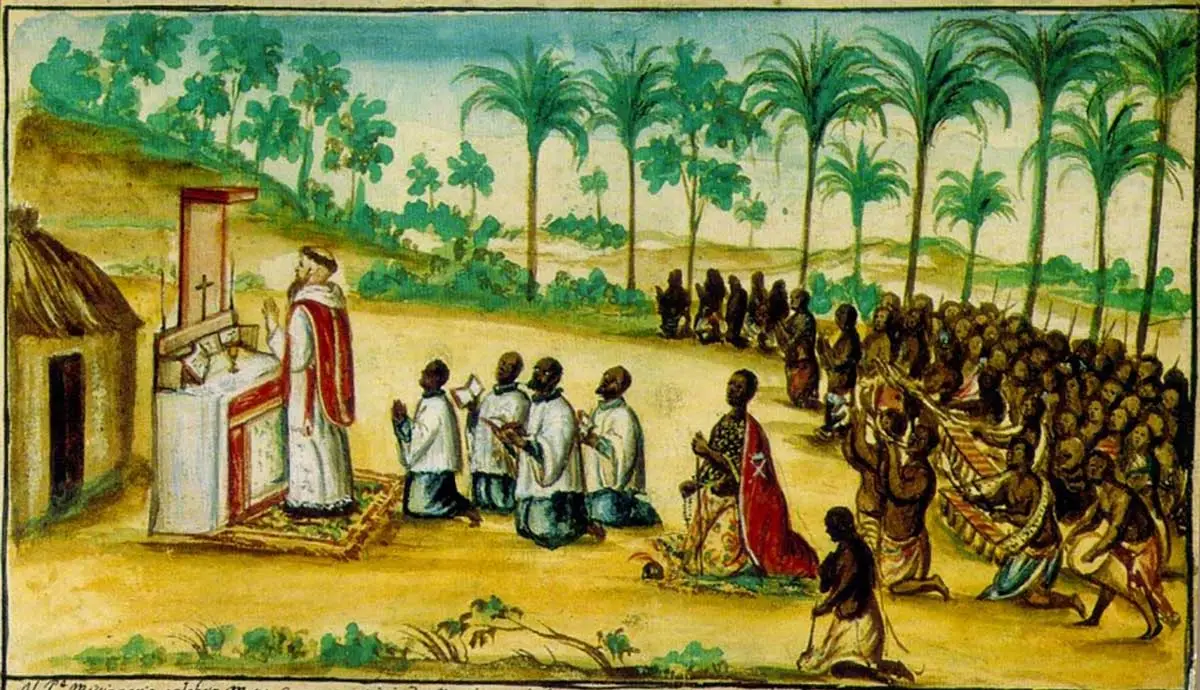-
“In 1483 the Portuguese explorer Diogo Cão was the first European to enter the Congo River and encounter the Kingdom of Kongo. After landing in the Congo estuary near a city called Mbanza Sonyo, Diogo Cão sent messengers and gifts to the king, Nzinga Nkuwu, who lived in the capital, Mbanza Kongo. After several weeks as his messengers were not returning, Diogo Cão decided to continue his journey and traveled 700 miles south. He later on returned to the mouth of the Congo, seized four Kongo nobles, and sailed for Portugal. In 1485 Diogo Cão set off again from Lisbon and returned to the Kongo kingdom with the four African nobles who, after spending nearly two years in Portugal, had been converted to Christianity and taught to speak some Portuguese. This time Diogo Cão traveled inland to Mbanza Kongo, where he met the king, who was greatly impressed not only by all the gifts the explorer brought from Portugal but also by the change that occurred in the lives of the four Kongo nobles.
The contact between the Kongo king and the Europeans had important and long-lasting consequences for the African kingdom. Diogo Cão returned to the Kongo capital city in 1491 and brought along with him Portuguese missionaries, monks, armed soldiers, masons, carpenters, peasants, and some women who had to instruct the Kongo people in Portuguese housekeeping. Soon the missionaries converted thousands of Kongo people to Christianity and baptized them, including King Nzinga Nkuwu, who decided to take the name João I in honor of Portugal’s king at the time, João II. João I ruled over the Kongo kingdom until 1506 and at his death was succeeded by his son Afonso Mvemba a Nzinga (famously known as Afonso I). The new king, Mani-Kongo Afonso I, who was raised as a Christian, worked hard to convert the whole kingdom to Christianity and European ways. As he was able to write and speak Portuguese, between 1509 and 1541 Afonso I sent several letters to kings, government officials, and church leaders in Lisbon, Rome, and the Vatican….
Establishing Christianity as the state religion, Afonso I renamed the capital city São Salvador and made important arrangements for the creation of Kongo schools, where children of nobles received religious instruction. He sent Henrique, his own son, to be educated in Europe, and in 1518 Henrique became an ordained priest and, later on, the first Kongo bishop. By the end of his rule, Afonso I had successfully created a new version of the Roman Catholic Church in his kingdom.
…Toward the end of the reign of Afonso I because of the high demands of the slave trade, the links between Portugal and the Kongo kingdom began to deteriorate. Portuguese were no longer willing to send to Kongo priests, doctors, or guns as gifts. Instead, they demanded slaves in exchange for anything that King Afonso I requested from Portugal. To meet the demands, the Kongo king undertook raids into neighboring territories to capture people and sell them into slavery. A greater instability was created within the Kingdom of Kongo when Portuguese traders, mostly interested in increasing their private fortunes, began to bypass the king in Mbanza Kongo and trade directly with provincial nobles and local officials. Consequently, the coastal province of Soyo became the most important point of purchase, sale, and embarkation for slaves. Receiving African captives from several sources, Portuguese traders were able to increase the number of slaves they sent to the New World to work the plantations. It is estimated that the Kingdom of Kongo alone in the 16th and 17th centuries was sending about 15,000 slaves annually.
Afonso I wrote several long letters to the king of Portugal to complain about the harsh treatment that his people received at the hands of Portuguese traders but received for the most part dismissive responses from Europe. Despite several restrictions that he introduced on the slave trade in his kingdom, thousands of captives continued to be illegally exported annually, causing severe destruction of the social structure of the kingdom and weakening the authority of the king.”
-Excerpt from Kongo by Daniel Kahozi in African Kingdoms by Saheed Aderinto
 Kwame, NonMwenSe and 2 others7 Comments
Kwame, NonMwenSe and 2 others7 Comments-
“The Portuguese explorer, Diego Cao, captured 4 Kongo nobles and sailed for Portugal.”
As early as 1483, Europeans were capturing Afrikans as slaves.
 1
1-
Indeed.
-
-
“The Portuguese demanded Afrikan slaves in exchange for anything King Alfonso I demanded from Portugal.”
The Europeans were the initiators, the manufacturers, the drivers, the force behind The Atlantic Slave Trade.
 1
1 -
“Despite the many restrictions that King Alfonso I put on the slave trade in the kingdom of Kongo, thousands, if not millions, of Afrikan slaves were continuing to be illegally captured and exported annually into the New World to work the plantations.”
Afrikans on the Continent resisted and fought to stop the illegal capture of enslaved Afrikans into the New World.
 1
1 -
The Christian missionaries did an excellent job, in fact they did a masterful job, on softening the hearts of the Afrikans for The Atlantic Slave Trade to ‘pop off.’
 2
2-
Yes, they facilitated the cultural penetration of African societies and the delegitimization of African institutions. They legacy of such actions are still being felt today.
-
-
Alfonso is an clarifying example of the systemic isft caused by Christinsanity (was talking about this like the other day)

 2
2
-




